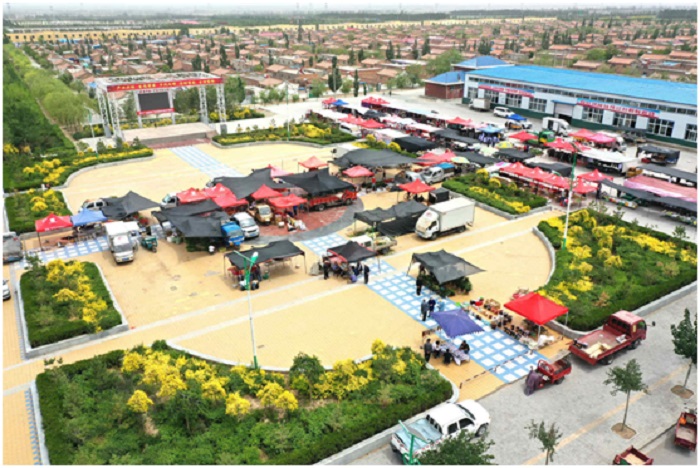



An e-commerce poverty alleviation workshop in Minning Township, Yongning County, Yinchuan, northwest China’s Ningxia Hui Autonomous Region returned to its usual hustle and bustle soon after the Spring Festival holiday ended.
Workers were busy promoting products on livestream shows, packing commodities, and printing bills. Local specialties such as wolfberries and red wine were shipped from there to destinations across China.
“I was almost illiterate when I started working here, and we learned from scratch under the help of the head of the workshop and poverty alleviation officials,” said Bai Xiyan, who came to the workshop in 2019 and later got promoted to the head of the workshop’s purchasing division due to his diligence. Now he earns nearly 3,000 yuan ($464.76) per month, and is getting more and more confident.
Bai’s story is an epitome of how the life of Minning’s residents has changed since the township was relocated for poverty alleviation.
Minning, which was a village of 8,000 residents 20 years ago, has evolved into a demonstration township that is home to more than 66,000 people. Resident’s annual disposable income soared from 500 yuan before the relocation to 14,961 yuan last year, and six incorporated villages gained over 6 million yuan each from rural collective economy in 2020.
Minning, which was barren in the old days, is now covered by bondless vegetation and farmlands, thickening the pocket of its residents with its prospering economy.
It was because of the poverty alleviation efforts that Minning Township started thriving.
In April 1997, then deputy Party chief of Fujian province Xi Jinping visited Ningxia for an east-west collaboration and pairing assistance program, where he was astonished by the poor and difficult conditions in the autonomous region’s Xihaigu, a place tormented by extreme poverty. Therefore, he made a strategic decision with profound impact: resettling the impoverished residents from the uninhabitable areas in Xihaigu to the Hetao Plain. Ever since, a new homeland for these residents was built, named “Minning” village (Min symbols Chinese abbreviation of Fujian and Ning symbols Chinese abbreviation of Ningxia).
“When we first started constructing the village, there was nothing live but sands and stones,” said Xie Xingchang, former Party chief of Funing village, Minning Township. “After building houses, flattening the earth, channeling water from the Yellow River and ensuring power and water supply, we gradually settled here,” he added.
Fujian Province takes Minning Township as its own administrative region, donating nearly 300 million yuan to help the latter’s development. The southeast province helped Minning build schools, and is inviting more than 100 outstanding officials and rural entrepreneurial leaders every year from the township to Fujian for investigation and study.
Pairing-off cooperation for poverty alleviation is like a “golden seed” that sprouted in the land of Ningxia, turning Minning Township from a barren desert into a beautiful and rich place.
“After 20 years of ceaseless endeavor, Minning was finally removed from the poverty list,” said Zhang Zhu, secretary of the Communist Party of China Yinchuan municipal committee. As of the end of the last year, all six impoverished villages in the township had quit the poverty list, and a total of 7,046 residents from 1,633 households had bid farewell to poverty.
To offer adequate food and clothing for residents was a primary task for Minning at the earliest days after the relocation. Therefore, it fostered traditional crop planting to ensure enough food for impoverished residents. After the launch of Fujian-Ningxia pairing assistance programs, Fujian motivated more enterprises to develop in Ningxia and establish joint organizations.
“In 1999, a batch of experts and technicians came here from Fujian to teach villagers mushroom cultivation. The government also issued loans to the planters, assuring them to follow the experts,” Xie told the People’s Daily.
At present, 13 enterprises and merchants from Fujian are running businesses in Minning with a total investment of 2.28 billion yuan, creating 3,500 jobs for local community. The number of Fujian enterprises in Ningxia has hit 5,700. They contribute over 1 billion yuan of tax per year and employ more than 100,000 local residents.
Thanks to the pairing assistance and Minning’s natural resources, the township has built an industrial pattern with wine-making, gardening and beef as the pillars, which has effectively increased the income of the poor people, Zhang noted.
By the end of 2020, enterprises in Minning had registered 48 trademarks of agricultural products, including four renowned ones at autonomous region level. Besides, the township also nurtured six leading enterprises of agricultural industrialization at autonomous region level, and 680 million yuan of featured poverty-alleviation agricultural products were sold last year.
The success of Minning Township has helped nurture 110 demonstration villages of Fujian-Ningxia collaboration, 78 Fujian-Ningxia collaboration relocated villages, and 320 resettlement areas. They have received more than a million residents relocated from Xihaigu.


The Executive and members of the.


The Acting Director, FCT Directorate of.


President Bola Ahmed Tinubu has been.



Barely a month after resignation of.


An Abuja based Legal Practitioner, Osuagwu.



Convener of Equitable Remedy, Mrs. Magaret.


Contractors handling the contract for city.


Nigerian government may have concluded plans.


The Diplomatic Correspondents Association of Nigeria.


A rights group, “Follow Me Talk.
Leave a Comment